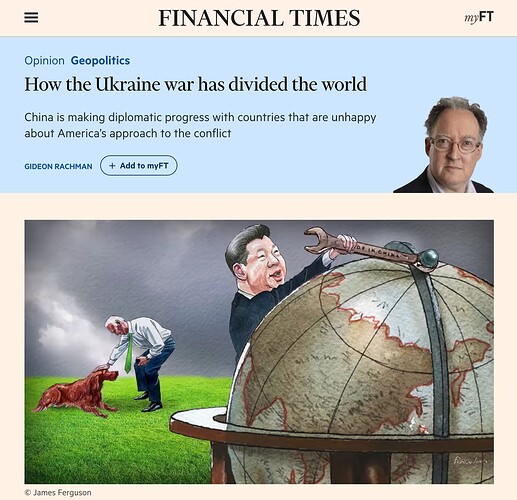-
当习近平在北京忙着接待巴西总统路易斯-伊纳西奥-卢拉-达-席尔瓦时,乔-拜登正在爱尔兰进行一次感性的旅行。
-
卢拉的信息传递对中国来说是顺理成章的,对美国来说则是令人不安的,因为他支持中国长期以来的目标,即破坏美元在世界金融体系中的作用。
-
中国最近在中东外交方面也取得了进展,伊朗和沙特阿拉伯的外交部长最近在北京举行了会晤。
-
中国和卢拉发出的信息都很明确;美国提倡战争,中国提倡和平;中国提倡贸易,而美国则实行经济制裁。
-
这在华盛顿引起了一些担忧,因为美国前财政部长拉里-萨默斯谈到了美国正在失去全球影响力的 "令人不安的 "迹象。
-
对乌克兰战争的态度分歧推动了这些转变,因为美国认为这是一个独特的事件,需要作出独特的反应,而世界其他地区则认为这是一个需要通过追求停火和妥协来管理的冲突。
-
美国以前所未有的经济制裁和冻结俄罗斯外汇储备来应对乌克兰战争。
-
然而,相当多的国家保持了与俄罗斯的贸易往来,因为全球南方拒绝加入对俄罗斯的排斥–正如印度外长在抱怨中表达了这种情绪,他认为欧洲认为 “欧洲的问题是世界的问题,但世界的问题不是欧洲的问题”。
-
对俄罗斯实施的制裁对世界其他国家造成了影响,例如,食品和能源价格上涨,并在全球南方的富人中造成不安。
-
被视为 "避风港 "货币的美元,由于美国的潜在制裁,现在被视为不太安全。
-
这导致美国的传统盟友,如沙特阿拉伯,向中国靠拢。
-
华盛顿和北京之间的紧张关系增加了美国的潜在制裁。
-
作为世界上最受欢迎的贸易货币,美国对中国的制裁将产生重大影响。
-
中国正在鼓励沙特阿拉伯和巴西等国家使用人民币进行双边贸易。
-
美国正在努力说服世界其他国家同意其在乌克兰战争中的立场。
-
如果它不能做到这一点,美国的全球地位可能会被削弱。
-
Joe Biden was on a sentimental journey to Ireland while Xi Jinping was busy in Beijing hosting President Luiz Inácio Lula da Silva of Brazil.
-
Lula’s messaging was congenial to China and disturbing to the US, as he backed a long-standing Chinese goal of undermining the US dollar’s role in the world financial system.
-
China has also made recent headway with its Middle East diplomacy, as the foreign ministers of Iran and Saudi Arabia recently met in Beijing.
-
The messaging from both China and Lula is clear; that the US promotes war and China promotes peace, and China promotes trade while the US imposes economic sanctions.
-
This is causing some concern in Washington, as former US Treasury Secretary Larry Summers spoke of “troubling” signs that America was losing global influence.
-
A divergence in attitudes to the war in Ukraine is driving these shifts, as the US sees it as a unique event requiring a unique response while the rest of the world sees it as a conflict to be managed by the pursuit of ceasefires and compromises.
-
The US has responded to the Ukraine war with unprecedented economic sanctions and the freezing of Russian foreign reserves.
-
However, a substantial number of countries have kept trading with Russia, as the global south refuses to join in the ostracism of Russia - as India’s foreign minister gave expression to this sentiment in his complaint that Europe thinks that “Europe’s problems are the world’s problems, but that the world’s problems are not Europe’s problems”.
-
Sanctions imposed on Russia have caused repercussions for the rest of the world, such as increasing food and energy prices, and creating unease among the wealthy in the global south.
-
The US dollar, seen as a “safe haven” currency, is now seen as less secure due to potential US sanctions.
-
This has caused traditional US allies, such as Saudi Arabia, to draw closer to China.
-
Tensions between Washington and Beijing have increased potential US sanctions.
-
As the world’s most popular currency for trade, US sanctions on China would have a significant impact.
-
China is encouraging countries like Saudi Arabia and Brazil to use the yuan for bilateral trade.
-
The US is struggling to convince the rest of the world to agree with its stance on the war in Ukraine.
-
If it fails to do so, the US’s global position may be weakened.
